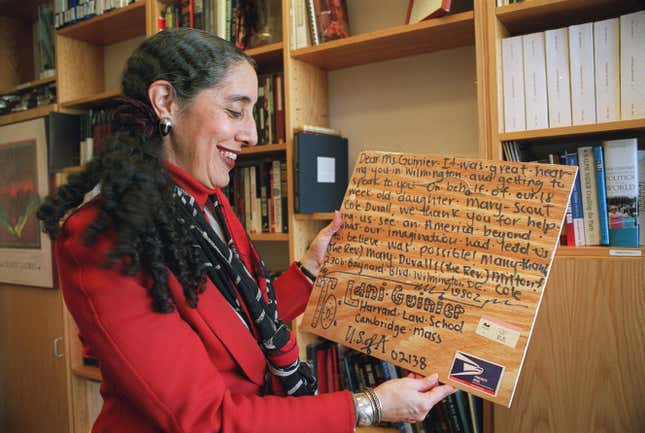
The world is mourning the loss of a true civil rights icon. For decades, Black Jewish Caribbean American legal scholar, Lani Guinier, challenged lawmakers to rethink the weight and distribution of voting rights among minorities. This past week, she lost her fight with Alzheimer’s disease, and died in an assisted living facility in Cambridge, Massachusetts at the age of 71.
As told to CNN reporters by her cousin, Sherrie Russell-Brown, “she was surrounded by family and friends” at the time of her passing.
Guinier became nationally known in 1993 when she was nominated by President Bill Clinton to become an assistant attorney general for civil rights. While serving as a professor at the University of Pennsylvania Law School, she caught Clinton’s attention for her work regarding affirmative action and voting rights. In the 1980’s, she led the voting rights project at the NAACP Legal Defense Fund, and had worked at the Civil Rights Division of the Justice Department prior to her time at the NAACP. Although Guinier’s political insight and voting rights initiatives were favored by Clinton, he was pressured into rescinding Guinier’s nomination shortly after it was announced.
Descending from a long line of lawyers, Guinier often challenged America’s legal institutions, and was known for her unorthodox views on voting rights and quotas. She believed that the “one person, one vote system” that civil rights pioneers had championed in the 1960’s, was inadequate to ensuring that minority voices were heard; she felt that ultimately, one vote entered by a person of color would not bear the same weight as a singular white vote, and would be even less impactful if they were of lower class backgrounds.
As told to the New York Times in 1993, conservative lawyer and activist Clint Bolick stated, “Clinton has not had to expend any political capital on the issue of quotas, and with her, we believe we could inflict a heavy political cost.”
Because of her progressive stance, Republicans (and some liberals) voiced their concerns to President Clinton, and her nomination was withdrawn only two months after its proposal.
Still in the spotlight years later as the former center of political controversy, she continued teaching, and later became the first woman of color to receive tenure from Harvard Law School in 1998. She also used her platform to publish a memoir about her nomination experience, entitled, “Lift Every Voice: Turning a Civil Rights Setback Into a New Vision of Social Justice,” the same year. Several other books followed, with her most recent title being “The Tyranny of the Meritocracy: Democratizing Higher Education in America”, published in 2016.
“She was easily one of the most innovative thinkers in the voting rights space,” Sherrilyn Ifill, the outgoing head of the Legal Defense Fund, said in a phone interview with The New York Times.
And this is precisely how she will be remembered. An innovative thinker, a solution oriented scholar, and a voting rights giant. May she rest in peace.

